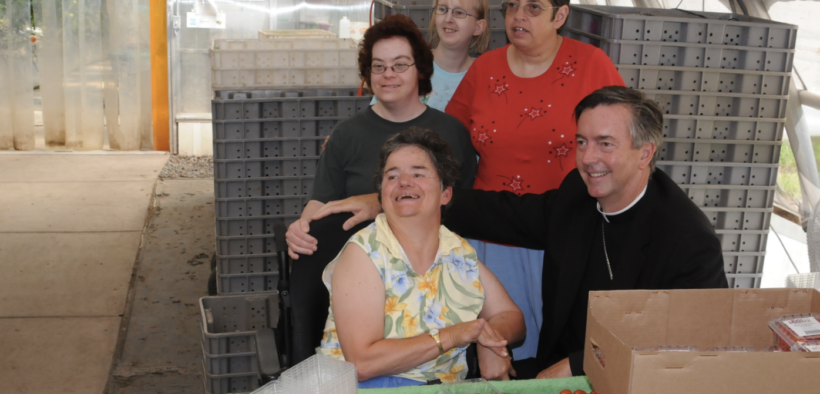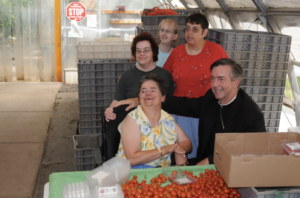Wisconsin Supreme Court Rules Against Catholic Charities Bureau
Majority found charity does not operate for “religious purposes,” despite religious motivation

On March 14, the Wisconsin Supreme Court ruled in a 4-3 decision that Catholic Charities Bureau of the Diocese of Superior was not exempt from having to pay unemployment tax to cover its employees because its actual activities are secular.

Catholic Charities Bureau / Photo via Becket
In her opinion, Justice Ann Walsh Bradley said the state’s Unemployment Compensation Act requires they operate primarily for religious purposes.
Catholic Charities argued that it met this definition because its motivation is “primarily religious.”
But the court decided motive is not enough. Bradley wrote that the statute required the court to “examine both the motivations and the activities of the organization.” Having done so, she concluded that Catholic Charities and four of its sub-entities “are not operated primarily for religious purposes” within the meaning of Wisconsin’s Unemployment Compensation Act.
The mission of Catholic Charities, which has been operating in the Diocese of Superior since 1917, is “to provide services to people in need, to advocate for justice in social structures and to call the entire church and other people of good will to do the same.”
The four sub-entities involved in this case are all involved in care and services for those with physical, mental, and developmental disabilities.
According to the court’s opinion, in 1972 the state’s Department of Industry, Labor and Human Relations determined that Catholic Charities was subject to paying unemployment tax because in its submission to the agency it described the nature of its operations as “charitable,” “educational,” and “rehabilitative,” not religious.
Catholic Charities had been making unemployment contributions into the state system since that time, the opinion stated.
In 2016, after a Catholic Charities sub-entity not involved in this case was exempted from the state unemployment system, Catholic Charities sought a similar exemption for other sub-entities.
The exemptions were denied and made their way on appeal to the Wisconsin Supreme Court.
The majority found that Catholic Charities and its sub-entities conduct activities that are primarily charitable and secular—services that “can be provided by organizations of either religious or secular motivations.”
Access to MinistryWatch content is free. However, we hope you will support our work with your prayers and financial gifts. To make a donation, click here.
“The record demonstrates that [Catholic Charities] and the sub-entities, which are organized as separate corporations apart from the church itself, neither attempt to imbue program participants with Catholic faith nor supply any religious materials to program participants or employees.”
“Although not required, these would be strong indications that the activities are primarily religious in nature,” the court’s opinion states.
Catholic Charities says their services “are based on gospel values and the principles of the Catholic Social Teachings.”
Becket, a non-profit, public-interest legal and educational institute representing Catholic Charities, also argued that the state’s decision not to exempt Catholic Charities violated the First Amendment’s religious protections.
It claimed the state’s interpretation of the unemployment tax law “requires Wisconsin courts to conduct an intrusive inquiry into the operations of religious organizations that seek the religious purposes exemption.”
It also argued the system interferes with internal church governance and ecclesiastical matters.
However, the majority disagreed, claiming the inquiry framework it laid out did not require the court to engage in an “impermissible examination of religious dogma.”
In her dissent, Justice Rebecca Grassl Bradley said the majority misinterpreted the statute to make it violate the First Amendment.
“By focusing on whether a nonprofit primarily engages in activities that are ‘religious in nature,’ the majority transforms a broad exemption into a denominational preference…,” she wrote in dissent.
“The majority’s misinterpretation also excessively entangles the government in spiritual affairs, requiring courts to determine what religious practices are sufficiently religious under the majority’s unconstitutional test,” Justice Rebecca Bradley added.
The ideological makeup of the Wisconsin Supreme Court flipped last year when liberal Janet Protasiewicz defeated the more conservative Daniel Kelly in a highly publicized election. Protasiewicz joined the majority opinion in this case.
Becket plans to appeal the decision to the United States Supreme Court.
Main photo: Catholic Charities Bureau / Photo via Becket
TO OUR READERS: Do you have a story idea, or do you want to give us feedback about this or any other story? Please email us: [email protected]



